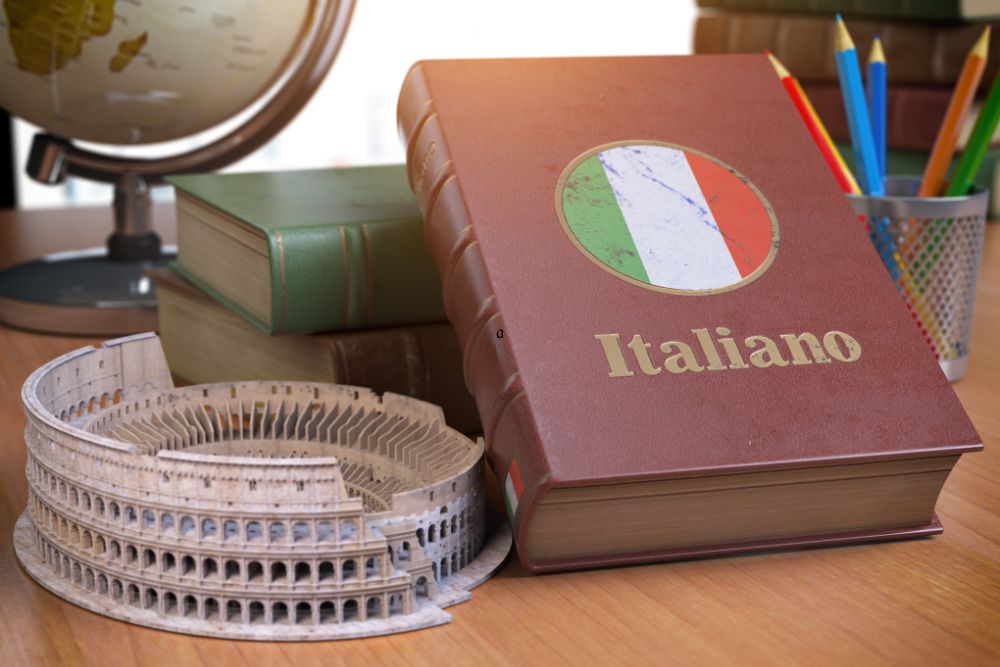Music has a unique ability to transcend barriers and connect people across cultures. For language learners, it offers an enjoyable and effective method to enhance vocabulary, pronunciation, and cultural understanding.
Italian music, with its rich tradition and expressive lyrics, is particularly well-suited for those looking to improve their Italian skills. By incorporating Italian songs and artists into your language learning routine, you can make the process more memorable, while engaging with Spaziolingua’s Intensive italian courses.
YOU CAN ALSO READ: Italian idioms and expressions: Unlocking the heart of the language
Iconic Italian Songs
Certain Italian songs have become iconic not only for their musicality but also for their contribution to the Italian language and culture. These songs can be powerful tools for language learners, providing a context for new vocabulary and idiomatic expressions.
“Nel Blu Dipinto di Blu (Volare)” by Domenico Modugno
Released in 1958, “Nel Blu Dipinto di Blu,” commonly known as “Volare,” is a classic that has stood the test of time. The song’s catchy melody and simple yet evocative lyrics make it a great starting point for learners. It introduces vocabulary related to colors, emotions, and flight, all set to a memorable tune.
“L’italiano” by Toto Cutugno
Toto Cutugno’s “L’italiano” is another beloved classic that captures the essence of Italian identity. The lyrics are filled with cultural references and everyday expressions, offering a window into Italian life. The song’s repetitive structure aids in memorization, making it easier for learners to grasp new words and phrases.
“Azzurro” by Adriano Celentano
“Azzurro,” performed by Adriano Celentano, is a song that has achieved legendary status in Italy. The lyrics tell a nostalgic story of summer and longing, rich with descriptive language and idiomatic expressions. Its upbeat tempo and engaging narrative make it a fun and educational choice for language learners.

Test your level of Italian
Artists to know from todays Italian music scene
Contemporary Italian music continues to evolve, with artists bringing fresh perspectives and innovative sounds. Knowing these musicians can help learners stay current and connected with modern Italian culture.
Måneskin
Måneskin, the rock band that won the Eurovision Song Contest in 2021 with their song “Zitti e Buoni,” has gained international acclaim. Their music is characterized by energetic performances and provocative lyrics, making it a dynamic tool for learning contemporary Italian slang and expressions.
Laura Pausini
Laura Pausini is a globally recognized Italian singer-songwriter known for her powerful voice and emotional ballads. Her extensive discography includes songs in both Italian and Spanish, offering a broad range of vocabulary related to love, relationships, and personal growth.
Mahmood
Mahmood’s music blends pop, R&B, and rap, reflecting the diverse influences of modern Italian culture. His song “Soldi,” which came second in the Eurovision Song Contest 2019, is particularly notable for its storytelling and use of colloquial language. Mahmood’s work provides insight into the experiences and expressions of younger generations in Italy.
Using music as a Learning Tool
Incorporating music into your language learning routine can significantly enhance your progress. Here are some practical tips for using Italian music to boost your skills!
Active Listening
Focus on the lyrics and try to understand the meaning of each line. Use online resources to find translations and explanations of difficult words or phrases. This practice helps improve listening comprehension and expands your vocabulary.
Sing Along
Singing along to Italian songs can improve pronunciation and intonation. The repetitive nature of choruses makes it easier to remember words and phrases, and the act of singing engages multiple senses, reinforcing learning.
Lyric Analysis
Analyze song lyrics to understand their grammatical structure and usage. This can provide context for grammar rules and idiomatic expressions. Discussing lyrics with other learners or native speakers can also enhance your understanding and appreciation of the language.
Embrace the Melody of Italian: Music as a Learning Resource
At Spaziolingua, we recognize the value of music in language learning and blend it into our curriculum to make the process more enjoyable and effective.
Incorporating music into your Italian language learning journey can transform the process from a chore into an enjoyable experience. Whether you’re listening to classic or contemporary hits, or participating in Spaziolingua’s interactive lessons, music offers a powerful and entertaining way to improve your skills.
Embrace the melody of Italian music and let it guide you to fluency!






